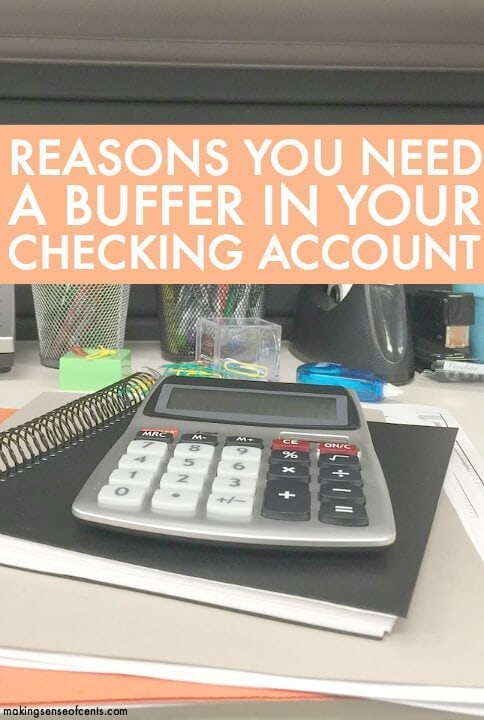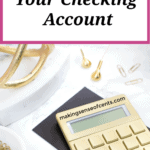 Hello! Please enjoy this blog post from a friend of mine. We have a buffer in our checking account and it gives us major peace of mind. Do you have a buffer?
Hello! Please enjoy this blog post from a friend of mine. We have a buffer in our checking account and it gives us major peace of mind. Do you have a buffer?
About a month ago, I discovered we had quite a decent buffer in our checking account. It has always been a lofty goal of mine to get one month ahead in our main household account.
I figured squirreling away a little here and there would contribute to the effort, but I never really took the time to look at how much we had in the account at the beginning of every month.
After a quick budget review, I saw we had a $1,600 surplus in our account! I knew I was squirreling, but I didn’t know I had all of those nuts set to the side. I was just leaving a little in the account at a time, but it’s obvious little unnoticed funds left here and there add up to a substantial amount.
I don’t plan to stop at the $1,600 mark though because it’s not anywhere near a month’s worth of income, but it’s definitely a start.
I’ll continue doing what I’ve been doing — add the money and ignore it.
Hopefully, within another year we’ll reach our goal of being a month ahead in our checking account. There are several reasons I can rattle off about why everyone should have a buffer in their checking account, but I’ll just share a few.
A buffer account can protect you from bad days.
Everyone has bad days.
They come when you’re least expecting them and they can cause serious setbacks when it comes to reaching your goals. It’s Monday morning, you’re already late for work and you have a flat tire on the freeway and you have no spare. Of course, you neglected to sign up for AAA and the tow truck is going to set you back $150.
Once you get your car to where it needs to be, the mechanic informs you it’s going to cost another $200 just to get a new tire put on. He also lets you know that your other tire is treading near the danger zone and it’s probably due to that alignment you need. See how easy it is to have an unexpected $500 expense on a bad day?
What about an unexpected visit to the emergency room? Most ER visits cost at least $100 with insurance. After visiting the ER, you’ll probably need some prescribed medication. This doesn’t include the day you missed from work because you were waiting at the hospital all day.
You may also simply overlook an upcoming expense. Your magazine subscription may be set for automatic withdrawal every three months and you forgot about the expense when you overspent at the grocery store last week. You figured you would be safe until your next paycheck, but the magazine subscription withdraws and gives you a negative balance.
Negative checking account balances could cause an overdraft.
Eighteen percent of Americans have overdrawn their account within the last year. In 2014, the average overdraft fee was $30 and these overdraft fees can have a domino effect. One purchase could lead to multiple overdraft fees if several expenses go in at the same time.
There were many times when I incurred multiple $35.00 overdraft fees. Fortunately, this is a distant memory. A $1,600 buffer in the account protects you from these unnecessary fees.
Of course, you can sign up for overdraft protection, but this type of protection doesn’t come cheap. Banks still charge something for this type of service and if your credit card account is linked to your checking account, it could borrow against the balance on your card.
Personally, I declined overdraft protection on my account. In the event purchases are made and money isn’t in the account, the bank will decline the purchase. Many individuals may not even know they can decline overdraft protection, and they pay for it every time the spend beyond their means.
A buffer could help you get a month ahead of your bills.
Wouldn’t it be nice if you could pay all of your current month’s bills from last month’s income? All the money you’re earning this month would be used to pay next month’s expenses. You would have an emergency fund built right into your checking account.
If things went wrong and you lost your job, you would already have next month’s expenses in your account! You wouldn’t even have to touch your actual emergency fund for a whole month. This may not excite many, but it surely excites me!
Being a month ahead gives you great peace of mind. According to a recent survey, a third of Americans earning $75,000 are living paycheck to paycheck. With a buffer in your checking account, this wouldn’t be you! You would be caught up with your bills and would currently be earning income that goes towards future expenses.
Extra money in your checking account brings peace of mind. It will be easy to set things up for auto-pay because you won’t have to guess whether you will be able to make the mortgage on the first. When your insurance payment is due, the money will already be in the account.
If you’re currently living paycheck to paycheck, do what I did. Put a little to the side every paycheck. Use unexpected windfalls of cash and sock away an extra $50 or $100 every single time. Don’t slack up and you’ll eventually notice a healthier checking account balance.
Don’t worry about the money being put to better use in a savings account. Yes, you could earn an additional $1 or $2 of interest if the money were in a savings account. You could also continue to overdraft your account every month and pay a $35 fee each time. The choice is yours.
Bottom line, If there is a cushion in your account, you are protecting yourself and building a strong financial foundation. A cushion gives you flexibility in your budget for any unexpected expenses and prevents bad days from becoming bad weeks.
You may not need a $1,600 buffer, but any bit of cushion would be better than none.
Do you have a checking account buffer? If so, share your tactics for building a buffer with the rest of us.
Author bio: Latoya is a freelance writer for hire who loves talking about budgets and money. Her mission includes paying off $79,000 in student loans and living to tell about it. She’s a full-time, work-at-home mama who shares her journey over at Life And A Budget. Connect with her on Twitter and Facebook.

Leave a Reply